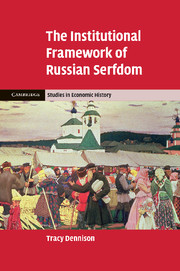Book contents
- Frontmatter
- Contents
- List of figures and tables
- Preface
- A note on the value of the rouble
- A note on transliteration
- List of abbreviations
- Glossary
- Map: Yaroslavl' and surrounding provinces
- 1 Why is Russia different? Culture, geography, institutions
- 2 Voshchazhnikovo: a microcosm of nineteenth-century Russia
- 3 Household structure and family economy
- 4 The rural commune
- 5 Land and property markets
- 6 Labour markets
- 7 Credit and savings
- 8 Retail markets and consumption
- 9 The institutional framework of Russian serfdom
- Bibliography
- Index
Preface
Published online by Cambridge University Press: 03 May 2011
- Frontmatter
- Contents
- List of figures and tables
- Preface
- A note on the value of the rouble
- A note on transliteration
- List of abbreviations
- Glossary
- Map: Yaroslavl' and surrounding provinces
- 1 Why is Russia different? Culture, geography, institutions
- 2 Voshchazhnikovo: a microcosm of nineteenth-century Russia
- 3 Household structure and family economy
- 4 The rural commune
- 5 Land and property markets
- 6 Labour markets
- 7 Credit and savings
- 8 Retail markets and consumption
- 9 The institutional framework of Russian serfdom
- Bibliography
- Index
Summary
The revolutionary popular movements that led to the collapse of the Soviet empire, and eventually of the Soviet Union itself, began about two decades ago. These events were accompanied, for the first few years, by millenial hopes on both sides of the former Iron Curtain. Such hopes for changes in the real world have, of course, been more and more disappointed since then, but that very disappointment has left one deep and lasting change in the intellectual world. In the subdiscipline of development economics, and in a number of subfields connected with it, a lesson has been learned. It has been recognised that institutions matter; indeed, this has become a slogan repeated by many who have little interest in the fate of eastern Europe or the particular problems of transition associated with that part of the world.
The presumed lesson has been to remind us of the degree to which the assumptions made by development economists were not so much assumptions about human behaviour as such, but rather assumptions about human behaviour in an institutional structure that guaranteed property rights and contract enforcement. (‘Remind’ since of course these conditions had been spelled out long ago by David Hume and Adam Smith at the dawn of classical economics.) This reminder has been very fruitful and has led research in development economics, political economy, and economic history in many new and interesting directions. This book can be regarded as one product of this general trend.
- Type
- Chapter
- Information
- The Institutional Framework of Russian Serfdom , pp. xi - xivPublisher: Cambridge University PressPrint publication year: 2011

